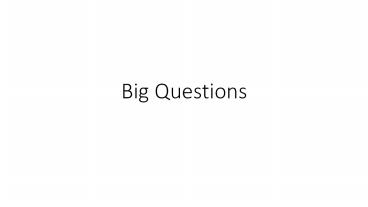Big Questions - PowerPoint PPT Presentation
1 / 7
Title:
Big Questions
Description:
... they can dissent from their nation and move to a different nation. ... Big Question 4: How did the Catholic Church respond to the new religious situation? – PowerPoint PPT presentation
Number of Views:23
Avg rating:3.0/5.0
Title: Big Questions
1
Big Questions
2
Big Question 1 What were the central ideas of
the reformers, and why were they appealing to
different social groups?
- What were the central ideas of the reformers, and
why were they appealing to different social
groups?
- Central ideas
- Faith earns salvation
- Clergy men have to pay their taxes
- Priesthood of all believers
- Word of God comes from scripture
- Indulgences are bad and should not be sold
- Pope needs less power
3
Big Question 1 What were the central ideas of
the reformers, and why were they appealing to
different social groups?
- Anyone can interpret scripture
- Church should give to charity
- Catholic Church needs to reform
- Stop selling positions in the church
- Appealing
- It took power away from the church and the pope
which would benefit other people - It didn't cost as much as Catholicism
- It's appealing because the common person could
interpret the bible not just take the popes word
for it.
4
Big Question 2How did the political situation
in Germany shape the course of the Reformation?
- 1. The Habsburg Dynasty was very powerful in
Europe, and Max (Holy Roman Emperor) married Mary
of Burgundy to form an alliance with France.
Charles V, who was the grandson of the Holy Roman
Emperor wanted to keep Europe United as a Western
Christendom. - 2. In the HRE, the rulers determined the religion
of their choice. Martin Luther starts to appeal
to German leaders. Some rulers agree with Luther
while others oppose him and attempt to seize
church lands. - 3. Zwingli was killed in religious wars between
Germany and Switzerland, and and the treaty
allows the small counties to choose what religion
they want to practice. - 4. Charles V reacted to this by calling the Diet
of Augsburg, which demanded all Protestants to
convert back to Catholicism. - 5. The Peace of Augsburg recognized Lutheranism
and the leaders of each state gets to decide
whether they are Catholic or Protestant. If
citizens do not agree with their religion, they
can dissent from their nation and move to a
different nation.
5
Big Question 3How did the Protestant ideas and
institutions spread beyond German speaking lands?
- Big Question 3 how did the Protestant ideas and
institutions spread beyond German speaking lands? - -The Printing Press spread Luther's idea's about
religion quickly and the church couldn't stop the
spreading because there were too many books. - -Educated people and the humanists agreed with
his ideas and helped spread Protestantism to
different popes and monks that have left the
Catholic Church for Protestantism. - -King Henry the 8th didn't agree with Catholicism
so he made his own his own religion, and helped
spread Protestantism throughout his countries. - -Calvinism informed Luther's idea of
justification by faith and emphasizes the grace
of God or salvation, it also started the spread
of new religions other than Lutheranism and
Calvinism.
6
Big Question 4How did the Catholic Church
respond to the new religious situation?
- Initial response- Catholic Church completely
rejected the idea and did everything they could
to stop it. (St Bartholomew's Day Massacre)
Then- Catholics began to reform the church,
educate the clergy, and get rid of corruption. - The Catholic Church refused to compromise with
the Protestants Council of Trent- stop selling
indulgences, assert power reaffirm beliefs,
expand missionary work seminary training, no
simony. - Spread message of reform education (built
schools) Spread Catholicism to Asia, Africa,
and the Americas
7
Big Question 5 What were the causes and
consequences of religious violence, including
riots, wars, and witch-hunts?
- Causes
- Other groups believed they were better
- No religious tolerance
- People were poor and could not afford indulgences
- Arrival of Protestantism
- Consequences
- People died
- Cities were destroyed
- New religious groups
- Witch hunts































